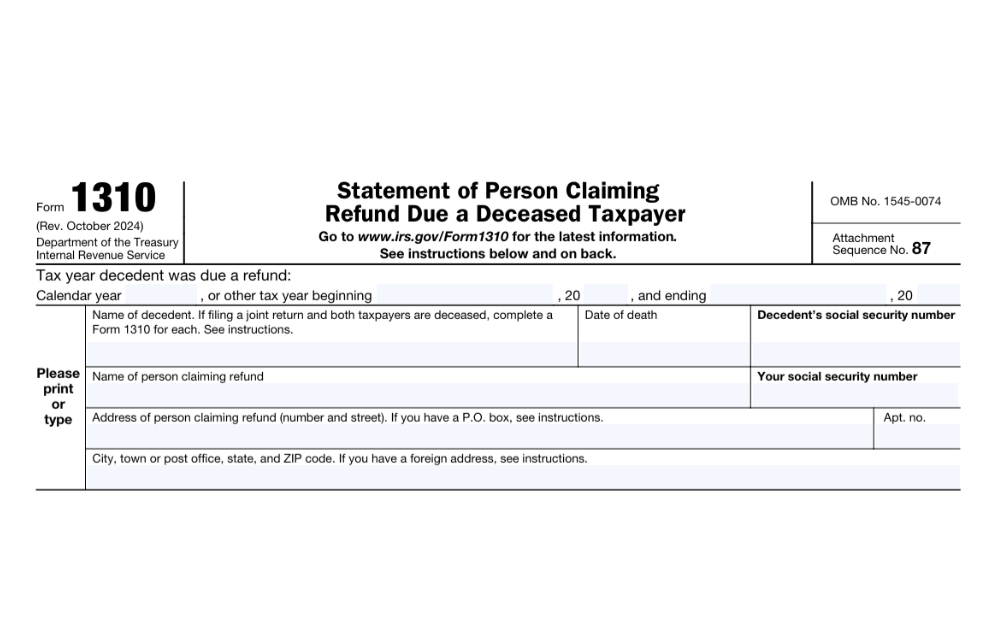Form 1310 Explained: How to Claim a Tax Refund for Someone Who Has Passed

- What is Form 1310?
- Who Needs to File Form 1310?
- When Form 1310 IS Required
- When Form 1310 is NOT Required
- Expat-Specific Scenarios
- How to Complete Form 1310
- Required Documentation
- Filing Process and Deadlines
- Common Challenges for Expats
- Processing Timeline and What to Expect
- Multiple Claimants and Disputes
- Tax Implications of Refunds
- Record Keeping
- Next Steps
The IRS estimates that millions of Americans are owed tax refunds each year, and unfortunately, some pass away before receiving them. Form 1310 allows family members and representatives to claim these refunds on behalf of deceased taxpayers. For American expats dealing with the loss of a loved one while living abroad, this form provides a clear path to recover money that rightfully belongs to the estate or family.
The bottom line: If someone close to you passed away and was owed a tax refund, Form 1310 helps you claim that money. The process is straightforward, and you typically have three years from the original due date to file. Most importantly, you won’t owe any additional taxes on refunds claimed through this form.
What is Form 1310?
Form 1310, officially titled “Statement of Person Claiming Refund Due a Deceased Taxpayer,” is a one-page IRS form that allows eligible individuals to claim tax refunds on behalf of someone who has died. The form serves as official notification to the IRS that the taxpayer has passed away and designates who should receive any refund owed.
Think of Form 1310 as a bridge between the deceased person’s final tax obligations and the proper distribution of any money owed to them by the government. It ensures that refunds don’t get lost in bureaucratic limbo and reach the rightful recipients.
Why This Matters for American Expats
When you’re living abroad and dealing with the loss of a family member, tax matters might be the last thing on your mind. However, failing to claim a deceased person’s refund means that money essentially disappears. For expats who may already be managing complex international finances, every dollar recovered can make a meaningful difference.
Additionally, if you’re the executor or representative of an estate, properly handling all tax matters, including refund claims, is part of your fiduciary responsibility. Form 1310 provides a clear, legal way to fulfill this obligation from anywhere in the world.
Who Needs to File Form 1310?
You’ll need Form 1310 if you’re claiming a refund for a deceased taxpayer and you’re NOT:
- A surviving spouse filing a joint return with the deceased
- A court-appointed personal representative with official documentation
When Form 1310 IS Required
- Adult Children or Other Relatives: If you’re an adult child, sibling, or other family member handling the deceased’s affairs without formal court appointment, you’ll need Form 1310.
- Informal Representatives: When family members step in to handle tax matters without going through probate or formal legal channels, this form establishes your authority to claim the refund.
- Executors Without Court Documentation: Even if you’re named as executor in a will, you’ll need Form 1310 until you have official court documents proving your appointment.
When Form 1310 is NOT Required
- Surviving Spouses: If you’re filing a joint return for the year your spouse died, you can claim the refund directly without Form 1310. The IRS will issue the refund check in both names.
- Court-Appointed Representatives: If you have official court documentation showing your appointment as personal representative or administrator, you don’t need Form 1310. Just attach a copy of the court certificate to the tax return.
Get the Free Download That Makes Filing Taxes Simple

Expat-Specific Scenarios
Scenario 1: Parent Dies While You’re Living Abroad
Sarah, an American expat living in Germany, learns that her father passed away and was owed a $2,800 tax refund. As his only child, she needs to file Form 1310 along with his final tax return to claim the refund. The money can be directly deposited into her U.S. bank account or sent as a check to her German address.
Scenario 2: Expat Dies, Family Claims Refund
Michael, an American living in Thailand, passed away before receiving his $1,500 refund. His sister in the United States can file Form 1310 to claim the refund on behalf of his estate, even though Michael was living abroad when he died.
Scenario 3: Joint Return After Death
Lisa’s American expat husband died in December 2024. Since they can file jointly for 2024 (the year of death), she doesn’t need Form 1310. She can file their joint return and claim any refund directly.
How to Complete Form 1310
Form 1310 is refreshingly simple compared to most IRS forms. Here’s what you need to provide:
Part I: Your Information
- Your name and address (can be a foreign address)
- Your Social Security Number
- Your relationship to the deceased
Part II: Deceased Taxpayer Information
- Full name of the deceased
- Social Security Number
- Date of death
- Tax year for which you’re claiming the refund
Part III: Required Questions
You’ll answer simple yes/no questions about:
- Whether a court appointed a personal representative
- Whether you’re a surviving spouse
- Your authority to claim the refund
Required Documentation
Always Required
Death Certificate: Attach a certified copy of the death certificate. If you’re abroad, you can obtain this from the U.S. consulate or embassy if the death occurred overseas, or request copies from the vital records office in the state where the death occurred.
Sometimes Required
Will or Estate Documents: If you’re claiming authority based on a will or estate planning documents, include copies to support your claim.
Power of Attorney: If you had power of attorney for the deceased, include documentation showing this authority.
Filing Process and Deadlines
Timing Requirements
You have three years from the original due date of the tax return to claim a refund using Form 1310. For most returns, this means three years from April 15th of the year following the tax year.
Example: For a 2024 tax return (due April 15, 2025), you have until April 15, 2028, to file Form 1310.
How to File
- With the Final Tax Return: The most common approach is to attach Form 1310 to the deceased person’s final tax return (Form 1040). Mail both forms together to the appropriate IRS processing center.
- Separate Filing: If the final tax return was already filed, you can mail Form 1310 separately. However, this may slow processing.
- Electronic Filing Limitations: Form 1310 typically cannot be e-filed. Even if the main tax return is e-filed, you’ll usually need to mail Form 1310 separately with required documentation.

Where to Send Form 1310
Mail Form 1310 to the same IRS service center where the deceased person’s tax return would normally be filed. The specific address depends on the state of residence at the time of death. Use the addresses listed in the Form 1040 instructions for your situation.
For expats, this is typically the address used for overseas taxpayers.
Dreading the last minute scramble of pulling together your tax documents? Despair no more!

Common Challenges for Expats
International Documentation
When living abroad, obtaining and authenticating documents can take longer. Start the process early and consider having documents apostilled if required for international use.
Currency and Banking
Refund checks can be sent to foreign addresses, but depositing U.S. Treasury checks abroad may involve fees. Consider maintaining a U.S. bank account for easier processing.
Communication Delays
Mail between the IRS and foreign addresses takes longer. Factor in extra time for all correspondence and consider using certified mail for important documents.
Time Zone Considerations
If you need to call the IRS for assistance, remember that their phone lines operate on U.S. time zones. Plan calls accordingly.
Processing Timeline and What to Expect
Normal Processing
Most Form 1310 claims are processed within 6-8 weeks if all documentation is complete and correct.
Potential Delays
Processing may take longer if:
- Documentation is incomplete
- The IRS needs to verify the death or your authority
- There are questions about the underlying tax return
- Multiple people claim the same refund
Following Up
If you haven’t heard back within 8 weeks, you can call the IRS practitioner priority service line or check the status online if you have the necessary information.
Multiple Claimants and Disputes
When Multiple People Claim the Same Refund
If several family members submit Form 1310 for the same deceased taxpayer, the IRS will hold the refund until the matter is resolved. This often requires:
- Legal documentation showing authority
- Court orders determining the rightful recipient
- Family agreements signed by all parties
Preventing Disputes
- Communicate Early: Before filing, discuss with other family members who will handle the claim to avoid conflicts.
- Document Your Authority: Keep clear records showing why you’re the appropriate person to claim the refund.
- Consider Legal Advice: For large refunds or complex family situations, consult with an estate attorney.
Tax Implications of Refunds
Good News for Recipients
Refunds claimed through Form 1310 are generally not taxable income to the person receiving them. You’re simply claiming money that was already owed to the deceased.
Estate Considerations
The refund becomes part of the deceased person’s estate and should be handled according to their will or state intestacy laws. While not taxable to you personally, it may affect estate tax calculations for very large estates.
Record Keeping
Documents to Retain
- Copy of Form 1310 and all attachments
- Death certificate
- Final tax return of the deceased
- Any correspondence with the IRS
- Bank records showing receipt of the refund
Duration
Keep these records for at least three years from the date you received the refund, or longer if required by state estate laws.
Next Steps
If you need to file Form 1310:
- Gather required documents including the death certificate and final tax return
- Determine your authority to claim the refund
- Complete Form 1310 with accurate information
- Attach all required documentation
- Mail to the correct IRS address for the deceased person’s state of residence
- Keep copies of everything for your records
- Follow up if you don’t hear back within 8 weeks
Dealing with the tax affairs of a deceased loved one is never easy, especially when you’re managing this from abroad. Form 1310 provides a clear, legal pathway to claim refunds that rightfully belong to the family or estate. While the paperwork may seem daunting during a difficult time, recovering these funds can provide important financial relief and properly close the deceased person’s tax obligations.
Have questions about Form 1310 or other expat tax matters? If you’re ready to be matched with a Greenback accountant, click the get started button below. For general questions on expat taxes or working with Greenback, contact our Customer Champions.
This article provides general information and should not be considered personalized tax or legal advice. Laws regarding estates and tax refunds can vary by state and situation. Always consult with qualified tax and legal professionals for advice specific to your circumstances.



